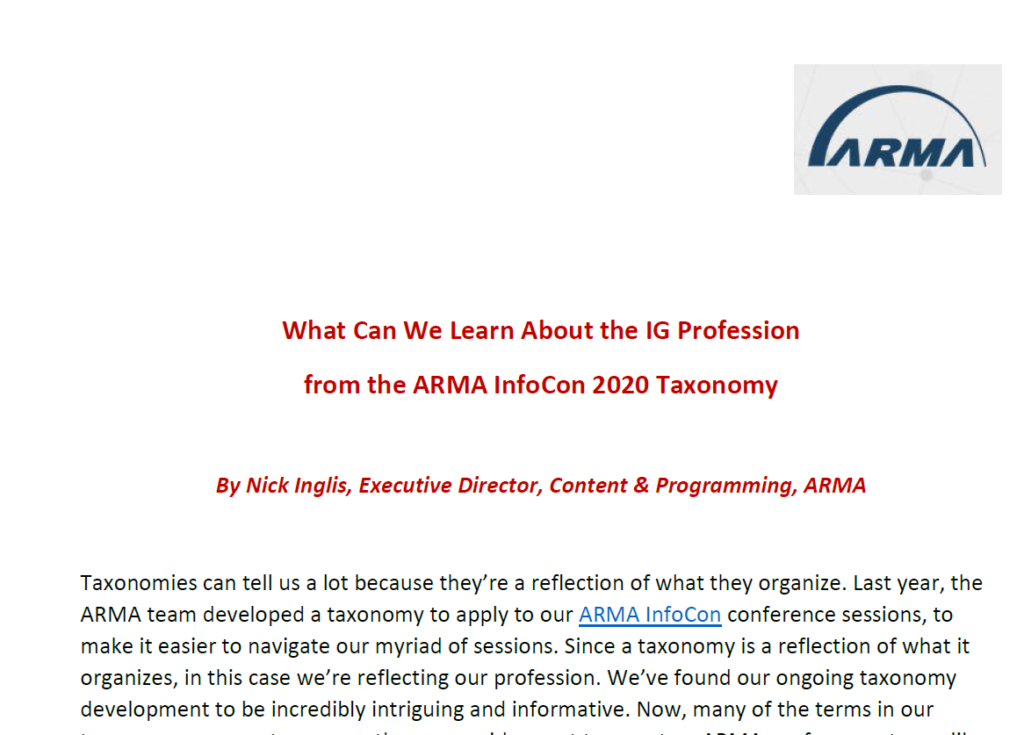What Can We Learn About the IG Profession from the ARMA InfoCon 2020 Taxonomy

Taxonomies can tell us a lot because they’re a reflection of what they organize. Last year, the ARMA team developed a taxonomy to apply to our ARMA InfoCon conference sessions, to make it easier to navigate our myriad of sessions. Since a taxonomy is a reflection of what it organizes, in this case we’re reflecting our profession. We’ve found our ongoing taxonomy development to be incredibly intriguing and informative. Now, many of the terms in our taxonomy represent common themes you’d expect to see at an ARMA conference, terms like “records management,” “information governance,” and “information management.” Last year’s taxonomy also included some terms that you may not have expected, like “Blockchain,” “interoperability,” and “process automation.”
This year, we discovered that we would need additional words in our taxonomy to:
- Clarify some areas of our existing taxonomy.
- Reflect broad trends in the information profession and areas of expansion.
- Supplement areas we simply missed in our previous taxonomy. (No taxonomy is perfect, so we continue to improve over time.)
- Add new structural terms that we want attached to sessions.
Some terms are too broad or too narrow to provide appropriate clarity. We found a handful of terms in our existing taxonomy that needed further clarification, which has led to new additions. On the need to reflect more clarity, a great example is the term “records management.” While “records management” encompasses “physical records management” and “electronic records management” (terms already within the taxonomy), we found a need for further clarification for the concept of “in-place records management,” an approach that leaves records in place within their information system. With several sessions on the topic slated for this year’s InfoCon (likely due to the ongoing adoption of Microsoft SharePoint and Office 365, where this approach is prevalent), we thought it would be easier for our attendees to filter just the sessions related to “in-place records management.” Thus, it has been added to our taxonomy.
These three terms were also added for clarity:
- Automation: broadening of the existing term “process automation”
- Information lifecycle management: narrowing of the existing term “information management” to this specific approach
- Natural language processing (NLP): narrowing of the existing terms “artificial intelligence” and “machine learning”
Many of the terms added to the taxonomy this year mirror greater trends in the information profession that are reflected through the sessions presented at ARMA InfoCon 2020. Some words were added because of the proliferation of a newer technology – for example, “ephemeral messaging.” Others were added because of a new conceptual advancement that is now being addressed – for example, “dark data,” a term that we’ve noted in the past but that is now used often enough to warrant inclusion.
In the following list are terms that were added to our taxonomy that reflect greater trends in both our profession and in our ARMA InfoCon 2020 sessions:
- 5G: Due to wider 5G availability, there are a pair of sessions that speak directly to the technology.
- Dark data: There is a case to be made that this should have been added last year, but we deferred then, and have added it this year.
- Enterprise social networks: Admittedly, this term should have also been included in our first year of creating the taxonomy, but it also may reflect some greater trends related to ongoing adoption of collaborative technologies during a time of pandemic.
- Ephemeral messaging: It pains me, personally, that this term should be added because, frankly, these platforms should not be utilized in most business settings. But if they are being utilized by executives and others in the organization, address it we must.
- Information Governance Implementation Model: Our IG model was launched earlier this year; a few sessions are specifically adapted to the model.
- Mergers, acquisitions, & divestitures (MAD): This term was added because of the challenges in MAD activities that are being addressed in our sessions.
- Personally identifiable information (PII): Because there are so many sessions that must address privacy concerns around PII, the term has become a necessity.
- Technology acquisition: While organizations have been acquiring technology for a long time, there are now more formalized approaches to technology acquisition that we believe will be helpful in the long-term development of our profession, so we are highlighting the term through our taxonomy.
The third category of tags includes those that are reflective of terms we really should have included in the development of our taxonomy, but didn’t (nobody’s perfect). For terms we’ve included this year that should have been included last year, we added:
- Career: With our Leadership Summit 2020 and a track on professional development, this term is related to several sessions this year, but it likely would have been helpful last year as well.
- Conflict resolution: We left some of the terms around so-called ‘soft skills’ on the cutting-room floor last year, but we’ve picked this one back up into the 2020 taxonomy.
- Destruction: While we already included “disposition,” that term wasn’t encompassing of the work of destroying physical IT assets. Thus “destruction” made its way into the taxonomy.
- Generally Accepted Recordkeeping Principles: I know, I know. I’ll never understand how we missed the term related to our world-standard records management model last year, but at least it only took us a year to correct, right?
- Intellectual property: With the addition of a specific track focused on legal topics, it should come as no surprise that IP is a necessary topic addition for 2020.
- Mentoring: The ARMA mentoring program continues to be a valuable resource for ARMA Professional members, and now there are sessions that can be easily found on the topic.
- Off-site storage: It’s not as though we weren’t discussing off-site storage previously, but it makes its debut in our taxonomy this year.
- Policy: The term should have been included last year.
- Risk management: There are more sessions on this topic this year, likely due to the pandemic, but “risk management” probably should have been added last year.
- ROT (redundant, outdated, trivial): A term that’s become common in information-related discussions, it has been added this year simply as ROT. The term may become “redundant, outdated, trivial (ROT)” to help those who are newer to the profession who may benefit from the descriptive term.
Lastly, there are four terms we’ve added that aren’t descriptive metadata, but are rather structural metadata, reflective of the structure of our conference. Last year, these terms weren’t necessary because we used them in our conference schedule to denote the type of session. We will continue to use those terms in our schedule, but we’re also including them as tags that are attached to the individual sessions as well – so that when we look at recordings or historically at session trends, we can see these terms included:
- Case study: These are sessions that feature real-world stories.
- Rapid Fire: These are sessions that are purposely brief in length.
- Sponsored: Some sessions are sponsored by business partners, and our attendees need to know this. While we’ve always flagged those sessions for full disclosure, we’re now also including the term in our taxonomy. Sponsored sessions are vetted for value before they are accepted.
- Workshop: Last year we launched our in-conference workshops for “Plus” attendees. We’re continuing workshops in this year’s conference, but in the virtual environment we’ve moved them into a special “Workshop Week” dedicated to workshop-style learning.
I look forward to seeing you leverage our taxonomy to select the sessions you want to attend at ARMA InfoCon 2020. Due to the pandemic, we’ve moved to a virtual conference this year, which means you can earn significantly more CEUs and have fewer concerns about schedule conflicts because most sessions will be recorded. Plus, attendees will have access to all conference sessions for weeks after the live portions of the conference have been completed. We have developed our most innovative and informative conference yet. So while we can’t physically be together for ARMA InfoCon 2020, we’re getting together anyway, virtually, and in new ways, with a fully re-envisioned conference experience. Register now and give us feedback on our taxonomy.

View the PDF version of this article.
[ls_content_block id=”759″]
About the Author
 Information Governance2022.07.18The IGP Exam: New and Improved
Information Governance2022.07.18The IGP Exam: New and Improved Analytics2021.02.01What’s Next in Information Governance? Continuous Audit and Analytics
Analytics2021.02.01What’s Next in Information Governance? Continuous Audit and Analytics Information Governance2020.11.19Information Governance: Alignment with Business is Essential
Information Governance2020.11.19Information Governance: Alignment with Business is Essential Information2020.09.11New Podcast Series Focuses on the Careers of Women Leaders in Information Governance
Information2020.09.11New Podcast Series Focuses on the Careers of Women Leaders in Information Governance
Trevor Banks
Feedback to ARMA – Very nice to (finally) see a better reflection of the changing discourse of our profession. To state the obvious, this must be done yearly. I hope these terms move us away from buzzwords (aka vague themes) and towards active dialogue on today’s professional issues. Thanks Nick.
Sarah Emes
Great article addressing the reality of the times we are in, and the need for the “information profession” to embrace new terms and socialize them effectively. Well done Nick.